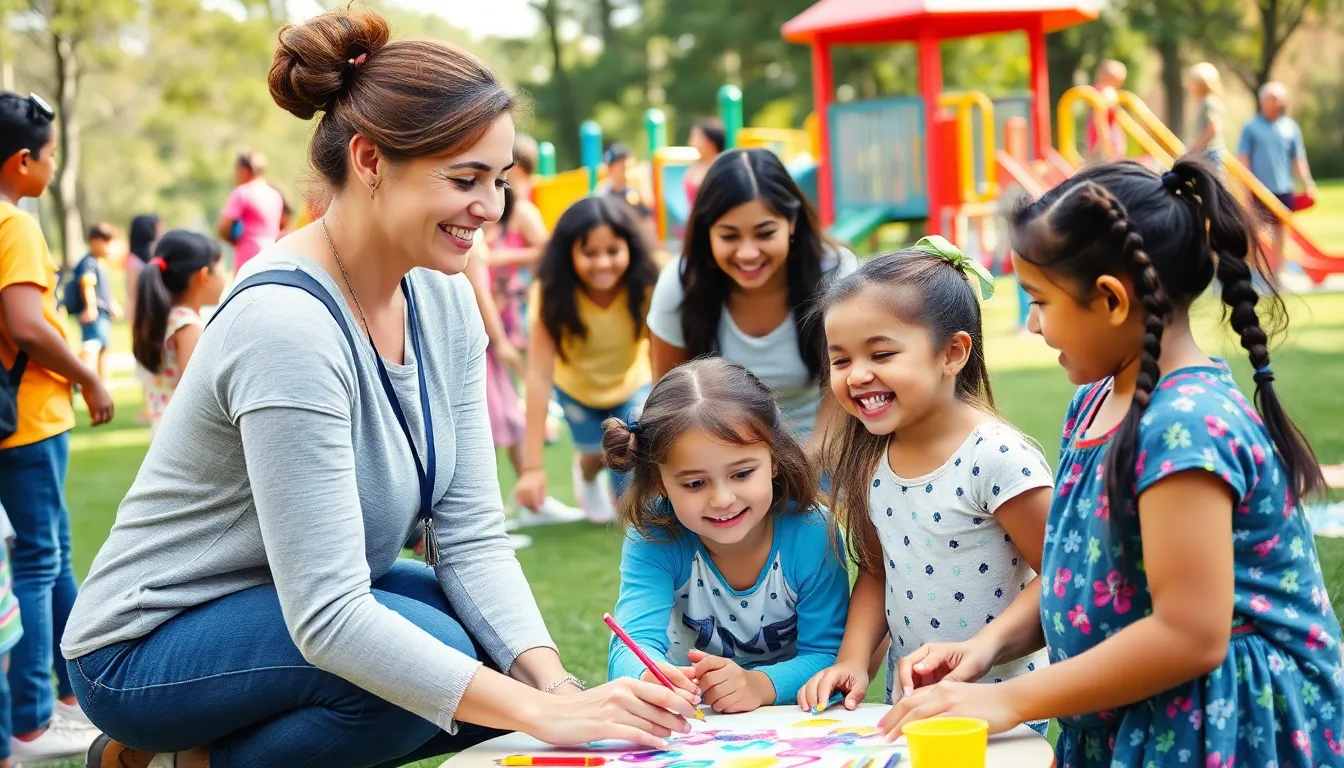Foster care volunteers are the unsung heroes of the child welfare system, stepping in to provide love and support when kids need it most. Imagine being the superhero who swoops in with snacks, a listening ear, and a heart full of compassion. It’s not just about making a difference; it’s about creating memories that last a lifetime—like the time you introduced a shy child to the wonders of pizza toppings.
Table of Contents
ToggleUnderstanding Foster Care Volunteer Roles
Foster care volunteers play a crucial role in supporting children and families within the child welfare system. They engage in various activities and responsibilities that significantly impact the lives of those in foster care.
Types of Foster Care Volunteers
Foster care volunteers can take on several roles, each with specific focuses. Some volunteers serve as mentors, providing guidance and support to children transitioning into foster care. Others act as advocates, ensuring children’s voices are heard in legal and educational settings. Additionally, there are respite caregivers, who offer temporary care to children in need, allowing foster parents a break and ensuring stability for the child.
Responsibilities of a Foster Care Volunteer
Foster care volunteers carry substantial responsibilities that contribute to the well-being of children. They often provide emotional support, helping children navigate their feelings and experiences. Organizing activities that promote social skills, such as group outings and educational workshops, is another key responsibility. Furthermore, maintaining communication with caseworkers and foster families ensures that all parties understand the child’s needs and progress.
Benefits of Being a Foster Care Volunteer

Foster care volunteers enjoy numerous benefits that extend beyond their commitment to helping children. Engaging in this impactful work fosters personal and social development.
Personal Growth and Development
Volunteering in foster care enhances personal growth and development. Experiences challenge individuals to step out of their comfort zones, fostering new skills. Through interactions with children, volunteers develop empathy, patience, and communication abilities. Many find that they gain a deeper understanding of complex social issues. Opportunities arise for volunteers to participate in training sessions, where they learn valuable tools for supporting vulnerable youth. This hands-on experience enriches their lives, instilling a sense of accomplishment.
Impact on Foster Children
Foster care volunteers make a significant impact on the lives of children. By providing emotional support, they help children feel valued and understood. Volunteers encourage social interactions, which build confidence and resilience in foster children. Activities organized by volunteers often create lasting memories, allowing children to experience joy and new opportunities. Communication maintained with caseworkers and foster families ensures that each child’s unique needs are met. Overall, the presence of dedicated volunteers can transform a child’s foster care journey into a more positive experience.
Challenges Faced by Foster Care Volunteers
Foster care volunteers encounter various challenges while supporting children in need. The emotional demands of the role can be significant, requiring resilience and self-care.
Emotional Toll and Support Needs
Caring for children in foster care often results in emotional strain. Volunteers might feel overwhelmed by the stories and experiences of the children they support. This emotional toll can affect mental well-being if not addressed. Utilizing peer support groups enables volunteers to share experiences and seek advice from others in similar situations. Accessing counseling services can also help volunteers process their feelings. Prioritizing self-care practices, such as exercise and mindfulness, fosters better emotional health, allowing volunteers to continue their important work effectively.
Training and Resources Available
Proper training and resources play a crucial role in preparing volunteers. Comprehensive training programs equip foster care volunteers with the necessary skills to meet children’s diverse needs. Workshops cover topics like trauma-informed care and effective communication strategies. Online resources, including forums and educational materials, provide continual learning opportunities. Engaging with experienced mentors enables volunteers to gain insights and practical advice. Utilizing these resources enhances the overall effectiveness of volunteers, ensuring the support they provide is both impactful and informed.
Success Stories from Foster Care Volunteers
Foster care volunteers create impactful moments that resonate deeply with children. They share inspiring experiences that foster development and connection.
Inspiring Experiences
Volunteers often witness transformative moments that highlight the strength of human connection. One volunteer recalls taking a shy child to a carnival, where the child experienced joy for the first time. This new experience led to laughter and memorable interactions with others. Volunteers foster self-esteem and confidence by introducing new activities, from sports to art classes. Each interaction contributes to a child’s sense of belonging. Future volunteers can draw motivation from these stories, knowing they can bring smiles and joy to children’s lives, enriching both their own and the kids.
Long-Term Relationships Built
Long-lasting relationships often develop between volunteers and children. Many volunteers find themselves closely connected to the families they support. One volunteer developed a bond with a teenager and continues to offer guidance years later. These relationships provide stability and comfort during challenging times. Consistent interactions help children build trust and feel cared for, which is crucial in their development. Additionally, many volunteers become advocates for the children even after their formal involvement ends. The ongoing connection fosters a sense of security, illustrating the profound impact volunteers have on the lives of children in foster care.
Foster care volunteers play an essential role in nurturing and supporting children in need. Their dedication not only transforms individual lives but also strengthens the fabric of the community. By stepping into the lives of these young individuals, volunteers create meaningful connections that foster growth and resilience.
The journey of a foster care volunteer is filled with challenges and rewards. As they navigate their roles, they contribute to a brighter future for children while also experiencing personal development. The impact of their efforts resonates far beyond the immediate moments, leaving a lasting legacy of hope and support. Embracing this opportunity can lead to profound changes for both volunteers and the children they serve.

